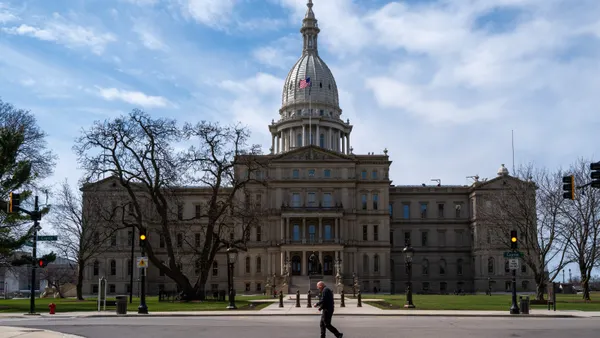Decatur, Illinois-based Land of Lincoln Credit Union will purchase in-state bank peer Williamsville State Bank and Trust in an all-cash transaction, the two said Friday.
The proposed transaction is set to close in the first half of 2026, contingent upon regulator and shareholder approval. Terms of the deal were not disclosed.
The transaction will grow Land of Lincoln to $576 million in assets and 18 branches, up from $478 million in assets and 15 branches.
“The acquisition is part of Land of Lincoln’s strategic growth plan, which includes adding branches to better assist our members in Illinois,” Land of Lincoln CEO Robert Ares said in a prepared statement. “Williamsville is a well-managed bank, and we look forward to welcoming their customers and employees into our family.”
This marks the 10th whole-bank acquisition by a credit union this year. The trend is off-pace from last year, when 22 CU-bank deals were announced.
The Independent Community Bankers of America, a frequent detractor of bank acquisitions by credit unions, said Tuesday the Land of Lincoln deal “demonstrates why the growing skepticism of credit union tax and regulatory exemptions must evolve into policymaker action.”
Friday’s transaction is hardly Land of Lincoln’s first purchase of a bank. It proposed buying Illinois’ Colchester Stae Bank in December 2022 and Nokomis Savings Bank five months later.
Not every credit union-bank deal comes to fruition, though. Two of the deals announced last year – TDECU’s proposed acquisition of Sabine State Bank and U.S. Eagle’s proposed acquisition of Southwest Capital Bank – have since been called off. One other – ELGA Credit Union’s attempt to acquire Florida’s Marine Bank – has been delayed into 2026.
Michael Bell, a partner at law firm Honigman who is often called an architect of CU-bank deals, said he doesn’t view the death or delay of these deals as “problematic.”
“Anytime something fails or is delayed, it's for unique reasons related to the buyer and seller – maybe both, maybe one, maybe the other. And that happens in bank-to-bank land as well,” he said.
Bell, who wasn’t involved in either failed transaction but is involved in the delayed transaction, said he continues to see “exceptionally high activity” in the space, despite changes at the National Credit Union Administration.
The NCUA said in May that it would be slimming down staff by 20% by year’s end. The agency has also operated with just one board member since April, when President Donald Trump fired two Democrats, Todd Harper and Tanya Otsuka, from the previously three-person panel.
Bell said he believes the NCUA is working to make the deals process more efficient and to be responsive to the market, just as the Federal Deposit Insurance Corp. has. While he said it’s “logical” to think that a faster bank-to-bank deal approval timeline may make credit unions less competitive as acquirers, he said he hasn’t personally noticed a drop-off in bank sellers wanting to engage with credit unions.
NCUA shutters Maryland credit union
The NCUA’s one-member board shuttered its fifth credit union of the year last week with the liquidation of Members First of Maryland Federal Credit Union in Baltimore.
MFMCU accounts were purchased by Aberdeen Proving Ground Federal Credit Union of Edgewood, Maryland, which most recently had $2.5 billion in assets, according to the NCUA.
NCUA liquidated MFMCU “after determining insolvency was imminent, and the credit union had no prospect for restoring viable operations,” the agency said. The credit union had $21.9 million in assets at the time.
MFMCU’s 3,638 members will experience no interruption in services and their accounts remain federally insured, according to a Friday announcement.
The NCUA in July liquidated Marion, Illinois-based Aldersgate Federal Credit Union and Middletown, Ohio-based Butler Heritage Federal Credit Union. Both had been placed in conservatorship earlier this year.
In June, the NCUA also liquidated Soul Community Federal Credit Union in Austell, Georgia, after placing it in conservatorship last year.
In April, the NCUA board liquidated Englewood Cliffs, New Jersey-based Unilever Federal Credit Union and declared it insolvent.














